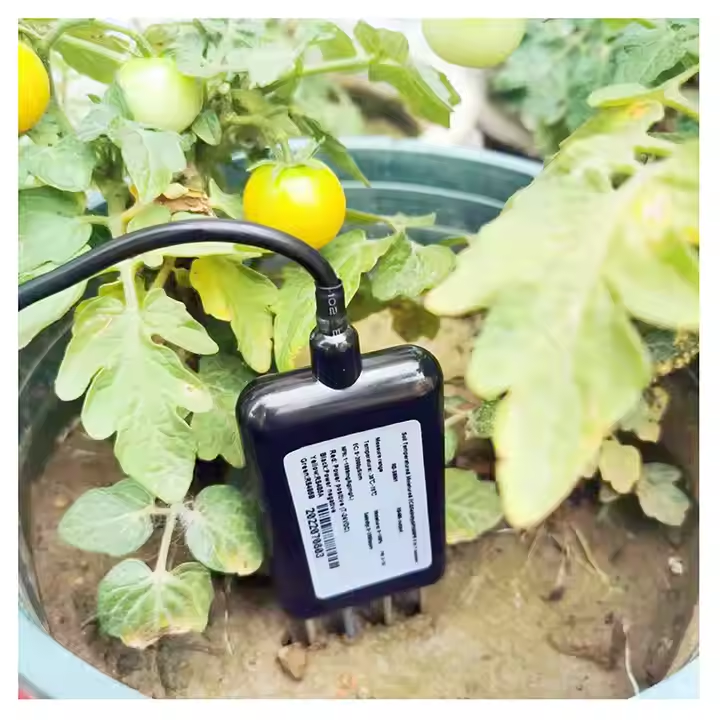Bangladesh, un país cuyo pilar económico es la agricultura, está modernizando y transformando su producción agrícola mediante la introducción de tecnología agrícola avanzada. Recientemente, el gobierno bangladesí ha colaborado con varias empresas internacionales de tecnología agrícola para promover el uso de sensores de suelo 7 en 1 en todo el país con el fin de mejorar la eficiencia de la producción agrícola, lograr una agricultura de precisión y promover el desarrollo sostenible.
Sensor de suelo 7 en 1: el núcleo de la inteligencia agrícola
El sensor de suelo 7 en 1 es un dispositivo multiparamétrico de monitoreo del suelo que puede medir simultáneamente siete parámetros clave, como temperatura, humedad, pH, conductividad eléctrica (CE) y contenido de nitrógeno (N), fósforo (P) y potasio (K). Estos datos son fundamentales para comprender las condiciones del suelo y orientar la fertilización y el riego. Al monitorear los parámetros del suelo en tiempo real, los agricultores pueden gestionar sus tierras de cultivo de forma más científica y mejorar el rendimiento y la calidad de sus cultivos.
El Ministro de Agricultura de Bangladesh declaró en una conferencia de prensa: «La introducción de sensores de suelo 7 en 1 marca un paso importante en nuestra modernización e inteligencia agrícola. Mediante el monitoreo preciso de las condiciones del suelo, podemos lograr una fertilización y un riego precisos, reducir el desperdicio de recursos y mejorar la eficiencia de la producción agrícola».
Efecto de la aplicación y retroalimentación de los agricultores
En muchas zonas piloto agrícolas de Bangladesh, la aplicación de sensores de suelo 7 en 1 ha logrado resultados notables. Según datos preliminares, las tierras de cultivo que utilizan el sensor han aumentado la eficiencia del uso del agua en aproximadamente un 30 %, reducido el uso de fertilizantes en un 20 % y aumentado el rendimiento de los cultivos en un promedio del 15 %.
Un agricultor que participa en el proyecto piloto comentó en una entrevista: «Antes aplicábamos fertilizantes y regábamos según la experiencia. Ahora, con el sensor de suelo 7 en 1, podemos gestionar las tierras de cultivo de forma científica con datos en tiempo real. Esto no solo ahorra costes, sino que también aumenta el rendimiento y permite que los cultivos crezcan más sanos».
Impacto ambiental y desarrollo sostenible
La aplicación de sensores de suelo 7 en 1 no solo mejora la eficiencia de la producción agrícola, sino que también contribuye positivamente a la protección del medio ambiente. Mediante una fertilización y un riego precisos, se reduce el desperdicio de fertilizantes y agua, así como la contaminación agrícola de los recursos hídricos y del suelo. Además, la gestión científica de las tierras agrícolas promueve la salud del suelo y mejora la capacidad de desarrollo sostenible de la agricultura.
El gobierno de Bangladesh planea promover aún más los sensores de suelo 7 en 1 en los próximos años y compartir esta experiencia exitosa con otros países del sur de Asia para promover la modernización agrícola y el desarrollo sostenible en toda la región.
Cooperación internacional y perspectivas de futuro
El gobierno de Bangladesh afirmó que seguirá cooperando con empresas internacionales de tecnología agrícola para seguir desarrollando y aplicando tecnologías agrícolas más avanzadas. Al mismo tiempo, el gobierno también planea brindar más capacitación agrícola y apoyo técnico para ayudar a los agricultores a dominar y utilizar mejor estas nuevas tecnologías.
Con la aplicación generalizada de sensores de suelo 7 en 1, la agricultura de Bangladesh avanza hacia la inteligencia, la precisión y el desarrollo sostenible. Esto no solo traerá prosperidad económica a Bangladesh, sino que también contribuirá a la seguridad alimentaria mundial y al desarrollo sostenible.
Conclusión
Las prácticas innovadoras de Bangladesh en el ámbito agrícola han sentado las bases para un nuevo paradigma en el desarrollo agrícola global. Con la introducción de sensores de suelo 7 en 1, Bangladesh no solo ha mejorado la eficiencia de la producción agrícola y la utilización de recursos, sino que también ha dado un paso importante hacia el desarrollo agrícola sostenible. En el futuro, con la aplicación de nuevas tecnologías, la agricultura de Bangladesh marcará el comienzo de un futuro mejor.
Para obtener más información sobre el sensor de suelo,
Por favor póngase en contacto con Honde Technology Co., LTD.
Email: info@hondetech.com
Sitio web de la empresa:www.hondetechco.com
Hora de publicación: 21 de enero de 2025


